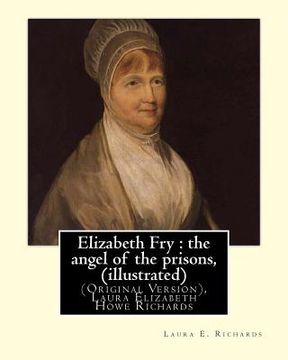Elizabeth Fry: the angel of the prisons, By Laura E. Richards (illustrated): (Original Version), Laura Elizabeth Howe Richards (in English)
Synopsis "Elizabeth Fry: the angel of the prisons, By Laura E. Richards (illustrated): (Original Version), Laura Elizabeth Howe Richards (in English)"
Elizabeth (Betsy) Fry (21 May 1780 - 12 October 1845), née Gurney, was an English prison reformer, social reformer and, as a Quaker, a Christian philanthropist. She has sometimes been referred to as the "angel of prisons". Fry was a major driving force behind new legislation to make the treatment of prisoners more humane, and she was supported in her efforts by the reigning monarch. Elizabeth (Betsy) Gurney was born in Gurney Court, off Magdalen Street, Norwich, Norfolk, England into a prominent Quaker family, the Gurneys. Her childhood family home was Earlham Hall which is now part of the University of East Anglia.Her father, John Gurney (1749-1809), was a partner in Gurney's Bank. Her mother, Catherine, was a member of the Barclay family who were among the founders of Barclays Bank. Her mother died when Elizabeth was twelve years old. As one of the oldest girls in the family, Elizabeth was partly responsible for the care and education of the younger children, including her brother Joseph John Gurney, a philanthropist. One of her sisters was Louisa Gurney Hoare (1784-1836), a writer on education. Prison work--Prompted by a family friend, Stephen Grellet, Fry visited Newgate Prison.[when?] The conditions she saw there horrified her. The women's section was overcrowded with women and children, some of whom had not even received a trial. The prisoners did their own cooking and washing in the small cells in which they slept on straw. She returned the following day with food and clothes for some prisoners. She was unable to further her work for nearly four years because of difficulties within the Fry family, including financial difficulties in the Fry bank[clarification needed]. Fry returned in 1816 and was eventually[when?] able to found a prison school for the children who were imprisoned with their mothers. She began a system of supervision and required the women to sew and to read the Bible. In 1817 she helped found the Association for the Reformation of the Female Prisoners in Newgate.This led to the eventual creation of the British Ladies' Society for Promoting the Reformation of Female Prisoners, widely described by biographers and historians as constituting the first "nationwide" women's organisation in Britain. Elizabeth Fry wrote in her book Prisons in Scotland and the North of England that she stayed the night in some of the prisons and invited nobility to come and stay and see for themselves the conditions prisoners lived in. Her kindness helped her gain the friendship of the prisoners and they began to try to improve their conditions for themselves. Thomas Fowell Buxton, Fry's brother-in-law, was elected to Parliament for Weymouth and began to promote her work among his fellow MPs. In 1818 Fry gave evidence to a House of Commons committee on the conditions prevalent in British prisons, becoming the first woman to present evidence in Parliament.... Laura Elizabeth Howe Richards (February 27, 1850 - January 14, 1943) was an American writer. She wrote more than 90 books including biographies, poetry, and several for children. One well-known children's poem is her literary nonsense verse "Eletelephony", which is adapted into an animated segment (Vowel Letter Poem: E - Elephant) produced by Jeff Hale, and his animation studio, Imagination, Inc., for the television show Sesame Street.

